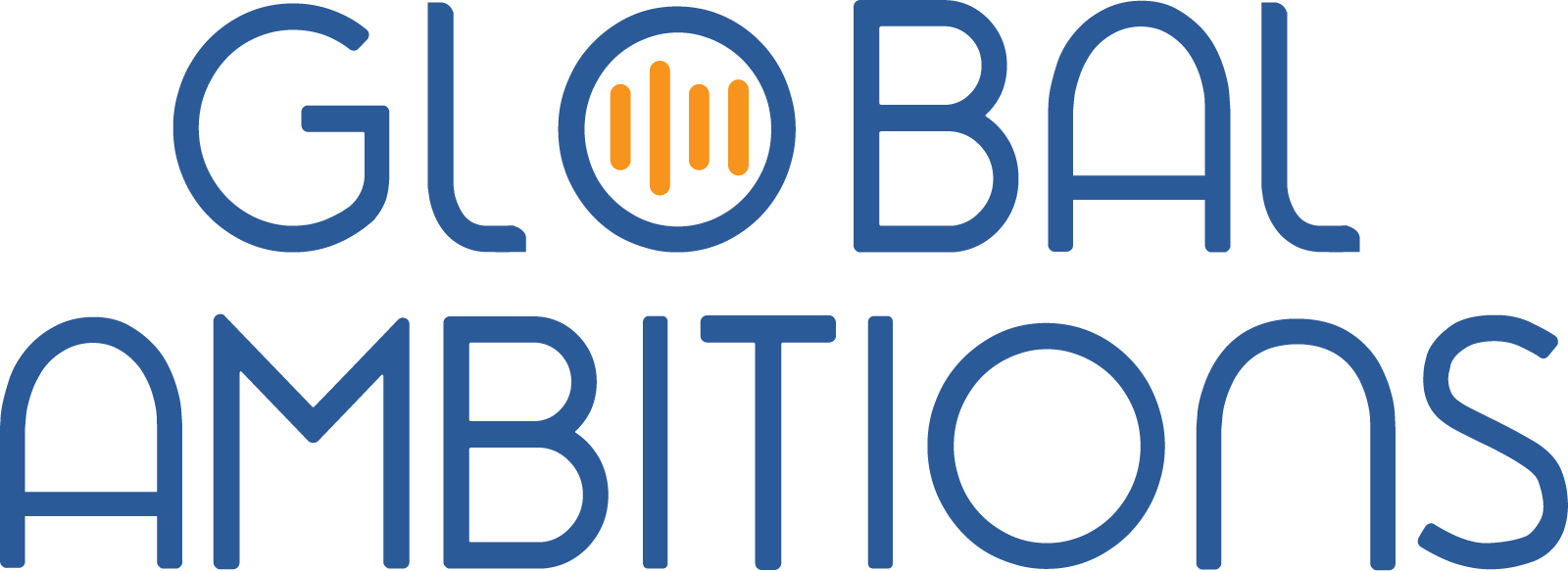With Jon Ritzdorf, Sr. Manager of Global Content Solutions at Procore and Adjunct Professor at Middlebury Institute of International Studies
Below is a complete transcript of this episode
Antoine Rey
Hi, I’m Antoine Rey, and I will be your host today for this Global Ambitions podcast episode. And today, my guest is Jon Ritzdorf, who is the Senior Manager of Global Content at Procore and also an Adjunct professor at the Middlebury Institute of International Studies, also known as MIIS Monterey. Jon, welcome to the program.
Jon Ritzdorf
Thank you very much, Antoine.
Antoine Rey
Today, we’re going to be talking about translation and interpretation, which we believe is dead, so long live translation and interpretation. So tell us maybe what’s happening from your point of view with T&I in the US, and why do we think we have a perfect storm that is brewing?
Jon Ritzdorf
It starts with T&I education in general. I’ve been in it since 2003, so it’s almost been 20 years. And T&I education in general has always been slow to adapt, right? To adapt to the realities of what’s going on on the ground in the industry, and what’s happening overall, right? So that’s where we start at. Because of that slow adaptation or change that’s going on, professors of T&I generally stick to what they know. The older generation of T&I professors is sticking to the things that have worked for them in the past, and they’re continuing to do that. However, as the generations get younger and we bring in younger people, younger people are more and more adept and knowledgeable about the language tooling that we have today. When you ask the average 15 or 16 year old, Oh, how do you translate this? They’re going to say, Oh, Google translate. That’s their immediate jump to what they do. My own kids have been proof to me that this is the way, as they would call it, Gen Z happens to think about language. And my kids are multilingual. So when they get homework, when they get anything, they think about Google translate.
They immediately think about that. That’s the first thing in their mind. So we’ve got an issue with teachers who aren’t really adapting the realities of where language, technology, and what people think of when they think of translation today. We’ve got the professors, we’ve got the young people. And then we have another issue, which is a perfect storm of education after COVID becoming… I don’t know how to really describe this, but education is not seen with the same level of value as it used to be. Let’s put it that way. Masters degree programs, this is just facts,That’s master’s degree programs, the amount of people enrolling in them is dropping significantly across all of the United States, at least. I don’t know worldwide, but in the United States, the number of people enrolling in master’s degree programs is dropping at a very precipitous rate. I think bachelor’s degrees too.
Antoine Rey
Are we talking about specifically in localization?
Jon Ritzdorf
Across the board. That’s why this is a perfect storm. It doesn’t matter. It’s not just T&I or localization. Just generally, enrollment in master’s degree programs and enrollment in higher education is dropping. Oh, by the way, and making that even worse, is that there was a population drop because now the people who are going in for higher ed were born during a time when we had a reduced population growth in the world. Overall, this is right around 9/11, right around the financial crisis. Those people are the people now coming into higher education, and we actually had a drop in population, especially in the US, during that time. So that’s also compounding the issue. So we’ve got this perfect storm of things all coming together to really hurt the future of T&I programs.
Antoine Rey
And is that driven by what? The cost of education you think in the States mainly, or are there other reasons there?
Jon Rizdorf
That’s the other thing, too, actually. That’s almost like another fifth factor, which is the cost of education, especially master’s degrees and stuff, is going, well, undergrad, too, has gone up so great that people just don’t see the value anymore. They find other ways. And also because employers are now… Back when I first graduated, if you didn’t have a bachelor’s degree at a minimum, good luck getting employed by any company. Now people are willing to forego and overlook those things and be like, You know what? If you’ve got experience, if you’ve got knowledge, I don’t really care. So because of that trend towards that, where you don’t have to have a lot of higher education necessarily, that’s also hurting enrollments and creating issues for the space.
Antoine Rey
We see, I think, a lot in the industry, a lot more micro learning or specialized learning, it seems. Is that what you’re seeing as well?
Jon Ritzdorf
Yeah. Tcredentialinghat’s what people are looking for. In fact, one of the things that they’ve been kicking around for a while at Miss is something called micro-credentialing. Micro-credentialing is giving people little bits of information to give them almost like a little credential, something you can sign off on as almost like a certificate like thing where you say, “This person is specialized in this”, or “This person has this knowledge”. That’s enough for some people. And so we’re starting to see a lot more of these things, micro-credentials, certificates, training courses. Localization Institute, I don’t know if you’ve noticed, but I’ve noticed personally, Localization Institute, I think it started to really market itself a lot more over the past few years. I’m not directly affiliated or know exactly what’s going on there, but I have noticed there’s no doubt that the number of courses they’re offering and the cadence of those courses has been increasing and the types of courses they’re offering is increasing. I think they’re the ones who are taking a benefit out of this, whereas higher education is taking the brunt of the drop.
Antoine Rey
What does that mean for institutions like the MIIS Institute or I think the Washington University as well is doing a full on master’s degree in localization and international studies?
Jon Ritzdorf
University of Washington does a certificate, not a master’s. Last I heard through the grapevine, they’re actually doing pretty okay, probably because, again, they’re doing that micro-credentialing idea, which is just three or four courses and you get something at the end of that. It’s the larger master’s degree programs that are suffering. What we’ve seen now so far, I can tell you now, the proof is right here, over 20 years, I’ve taught for six different programs. Out of those six different masters certificate slash whatever T&I programs. Out of those, the ones that are still surviving today, one. It’s really gone down this pathway for a while. They’re also very expensive to run. This is even before we had the perfect storm of right now, running TMI programs is very expensive because if you think about it, you’re trying to deal with a multilingual audience. Let’s just say you have 20 students. Let’s just say you get lucky. That’s pretty high for a T&I program. You get 20 people in. Three of them are doing French, five of them are doing German, two of them are doing Arabic, etc. The thing is, you’ve got to get a teacher for each one of those.
Well, you’ve got one teacher teaching Arabic translation to two students. It’s not cost-effective.
Antoine Rey
The economics don’t work.
Jon Ritzdorf
Doesn’t work. Yeah, the economics don’t work out. Nobody would run a business like that. What happens is when that gets up, I say this all the time, academia is just like corporations. They’re exactly the same structure. You’ve got your director running that program, you’ve got deans or somebody looking at the numbers and they’re like, “This is not really working out.” Now, academia has the advantage of sometimes running at neutral, almost like a nonprofit. But the problem is eventually, these numbers stop working out, they start running at a loss. And that starts to kill off the T&I programs because eventually somebody looks at the balance sheet and they’re like, “This program is losing money” and nobody can afford to lose money. You can’t afford to keep programs running.
Antoine Rey
What does that mean for MIIS, for instance, or what does that mean for our industry in general, if we’re not producing more graduates in localization? And what’s the solution, like more microlearning or modularization? It should be as part of a different part of the university and tag along with business courses that may be more attractive to students as different modules within the spectrum of localization skills that we’re teaching?
Jon Ritzdorf
Well, I’ll tell you what I think we’re going to need to start doing. What MIIS is already starting to look at overall is that the reality is we’ve got these dropping enrollments and master’s programs, but the truth of the matter is if we look at the language industry overall and language-related jobs, for example, you look at the Slater language job index, which they stopped just doing last month, but it’s never really gone below the baseline they started at, except during COVID it briefly dipped under. But it’s always been going up. The number of language jobs out there is not going down. So we do have a contradiction here. The number of language jobs is not going down, but the education in those jobs is falling apart in some ways other than through micro credentials and other things.
So what programs need to do, and what MIIS is even looking at is we’re trying to find a way to still keep this education alive. But the idea is we need to start finding a way to create a funnel to bring students in who are interested in language, culture, they just enjoy international and travel, and find a way to get them into a stream where they learn the work skills, they need to be able to take those language jobs.
So instead of T&I, one of my biggest arguments has been so far, like, if we keep on calling it translation and interpretation, we’re going to fail. Because when my Gen Z children hear the word translation, their first thing in their mind is that’s already handled by this thing called Google Translate. Right? That is their mental state. I’m not saying they’re right. I’m just saying that is their mental state.
Antoine Rey
Yeah, they don’t they don’t want a career in that.
Jon Ritzdorf
Yeah, exactly. Why would you be I mean, I was just joking with somebody last week like this is, well, it wasn’t a joke, it was pretty serious. I was talking with a former MIIS dean. And I said, it’s probably like, touch typing, right? Touch typing was something I’m sure you could major in, it was probably something that you could get a degree in secretarial skills or whatever, in the 1950s. Right, nobody gets a degree in that anymore. All right.
So that’s essentially where we’re at, I think with T and I, to some degree, we’re kind of at this edge point where it’s like, we got to start thinking about what to do. So rather than continue to call it T&I, we need to start finding a way to create some kind of degree that can funnel those people who are interested in language interested in culture, and want to take jobs related to that. So you know, what would the degree be called, I’m still trying to figure that out, maybe language for professional purposes, maybe, you know, it’s some kind of Applied Language or applied culture kind of degree, those people would then get training, right?
You give those people training in NLP skills, language technologies, and I don’t mean just translation tech I mean, language technologies, of which there’s a million and a lot of them are built on NLP, right? You train them in project management, you train them in language, business management, stuff, like you’re, you’re doing agile and right is, you know, stuff related to how does the language industry work? How does it make money, right? So you give them that business background as well, then from there, they could decide maybe to specialize, okay, I do want to become a freelance translator. Great. Here’s a pathway for you, right?
So you start with this bigger funnel that kind of capture those people, and then you funnel them out into where they probably have the most interest. So freelance translation over here, this person over here is interested in localization management over here, this person over here is interested in becoming an NLP researcher. Right?
So we need to kind of create this general funnel, I think now to kind of capture people and then let them specialize from there even trying to track like, individual to more like business orientated costs, as well as the operational aspects, you know, of what we do in localization. But certainly to have like international go to market strategy, for instance, would be probably a lot more attractive.
Antoine Rey
And I know like Natalie Kelly, has a new book coming out this year that will talk about that a little bit more than just localization. That could be very interesting. I agree with that.
Jon Ritzdorf
I just want to say Natalie is also I think, adjunct teaching right now at MIIS at the moment. And I think that’s a really good point, Antoine, another thing that I didn’t even think about, but you’re totally right language strategy is a whole nother area also, that I think people could be really excited about. So, you know, I think that’s the ideas like, we got to funnel them all in anybody who’s interested in language, culture, International. There’s tons of people in that pool, right? That pool is huge.
There are still people out there getting Language and Literature degrees, just like I did, just like many people in our industry did right now getting them into a funnel, and creating job opportunities for them by saying, hey, look, you know, you can take these skills and you can apply them in language strategy is the way of the future to me, rather than trying to pigeonhole everybody into T&I. Yeah.
If you’re an Asian Studies major, maybe you’ve only had like two years of Chinese or something, not 13 years, like I did at the time, you’re probably just like, What is this? This is ridiculous. I can use Google Translate to get most of what I need.
Antoine Rey
But if you tell them, you’re going to be studying things to help businesses to go international and to go global, then that becomes a lot more.
Jon Ritzdorf
Yeah, totally, totally. So localization programs aren’t suffering quite as much because they’ve got a good story. Right? You can help companies take their products and services internationally. Right, that is part of what you’re doing there.
But I think we need to expand that story into something much more broad for people who are like, Yeah, you know, there’s gonna be people out there a lot of MIIS students, they want to do more for the benefit of humankind, right. So they don’t necessarily want to just hock products and services. So we need to be able to capture them as well in something that’s a little bit more general. And then let them choose to specialize. Maybe they will choose to do localization, but they might choose to do international marketing. They might choose to work for a nonprofit as their language technology guru, they might choose to do you know management on the ground for a nonprofit in another country to help them connect the local populations to translation resources, right? And so they need project management skills, for example. So that’s what we need to start capturing is that audience.
Antoine Rey
Thanks very much, John, for coming on the show, and we’ll talk again very soon.
Jon Ritzdorf
Sure, take care.

Jon Ritzdorf
Sr Manager of Global Content Solutions at Procore & Adjunct Professor at Middlebury Institute of International Studies




